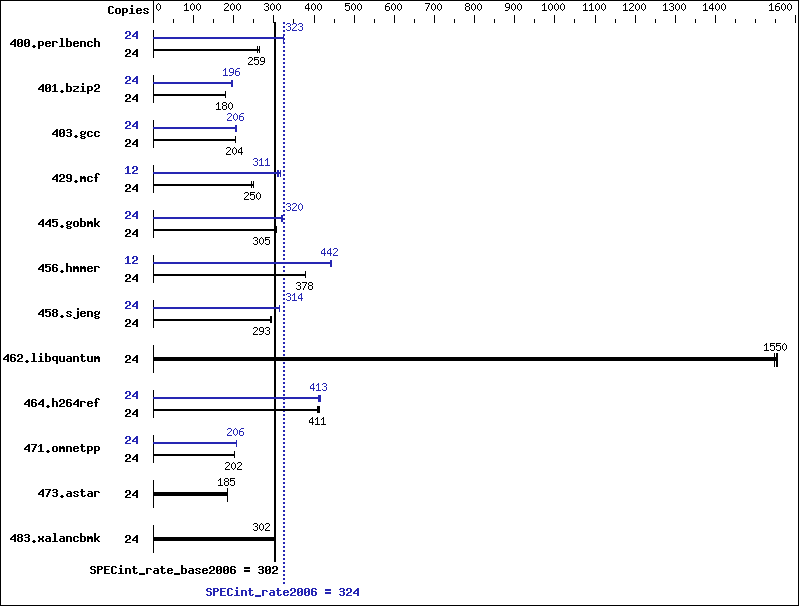| CPU2006 license: | 20 | Test date: | Apr-2011 |
|---|---|---|---|
| Test sponsor: | Bull SAS | Hardware Availability: | Feb-2011 |
| Tested by: | Dell Inc. | Software Availability: | Jan-2011 |

| Hardware | |
|---|---|
| CPU Name: | Intel Xeon E5649 |
| CPU Characteristics: | Intel Turbo Boost Technology up to 2.93 GHz |
| CPU MHz: | 2533 |
| FPU: | Integrated |
| CPU(s) enabled: | 12 cores, 2 chips, 6 cores/chip, 2 threads/core |
| CPU(s) orderable: | 1,2 chips |
| Primary Cache: | 32 KB I + 32 KB D on chip per core |
| Secondary Cache: | 256 KB I+D on chip per core |
| L3 Cache: | 12 MB I+D on chip per chip |
| Other Cache: | None |
| Memory: | 48 GB (12 x 4 GB 2Rx4 PC3-10600R-9, ECC) |
| Disk Subsystem: | 1 x 146 GB 15000 RPM SAS |
| Other Hardware: | None |
| Software | |
|---|---|
| Operating System: | SUSE Linux Enterprise Server 11 SP1 (x86_64), Kernel 2.6.32.12-0.7-default |
| Compiler: | Intel C++ Compiler XE for applications running on IA-32 Version 12.0.1.116 Build 20101116 |
| Auto Parallel: | No |
| File System: | ext3 |
| System State: | Run level 3 (multi-user) |
| Base Pointers: | 32-bit |
| Peak Pointers: | 32/64-bit |
| Other Software: | Microquill SmartHeap V9.01 |
Results Table
| Benchmark | Base | Peak | ||||||||||||
|---|---|---|---|---|---|---|---|---|---|---|---|---|---|---|
| Copies | Seconds | Ratio | Seconds | Ratio | Seconds | Ratio | Copies | Seconds | Ratio | Seconds | Ratio | Seconds | Ratio | |
| Results appear in the order in which they were run. Bold underlined text indicates a median measurement. | ||||||||||||||
| 400.perlbench | 24 | 886 | 265 | 905 | 259 | 907 | 259 | 24 | 726 | 323 | 725 | 323 | 727 | 323 |
| 401.bzip2 | 24 | 1295 | 179 | 1289 | 180 | 1284 | 180 | 24 | 1185 | 195 | 1183 | 196 | 1184 | 196 |
| 403.gcc | 24 | 943 | 205 | 945 | 204 | 947 | 204 | 24 | 940 | 206 | 936 | 206 | 947 | 204 |
| 429.mcf | 24 | 897 | 244 | 875 | 250 | 875 | 250 | 12 | 346 | 317 | 352 | 311 | 353 | 310 |
| 445.gobmk | 24 | 823 | 306 | 826 | 305 | 827 | 304 | 24 | 788 | 319 | 786 | 320 | 785 | 321 |
| 456.hmmer | 24 | 593 | 378 | 593 | 378 | 593 | 378 | 12 | 254 | 441 | 253 | 442 | 253 | 442 |
| 458.sjeng | 24 | 990 | 293 | 993 | 292 | 988 | 294 | 24 | 927 | 313 | 926 | 314 | 924 | 314 |
| 462.libquantum | 24 | 320 | 1560 | 320 | 1550 | 322 | 1550 | 24 | 320 | 1560 | 320 | 1550 | 322 | 1550 |
| 464.h264ref | 24 | 1296 | 410 | 1282 | 414 | 1292 | 411 | 24 | 1288 | 413 | 1289 | 412 | 1280 | 415 |
| 471.omnetpp | 24 | 743 | 202 | 744 | 202 | 743 | 202 | 24 | 727 | 206 | 727 | 206 | 726 | 207 |
| 473.astar | 24 | 909 | 185 | 908 | 186 | 909 | 185 | 24 | 909 | 185 | 908 | 186 | 909 | 185 |
| 483.xalancbmk | 24 | 549 | 302 | 550 | 301 | 548 | 302 | 24 | 549 | 302 | 550 | 301 | 548 | 302 |
Submit Notes
The config file option 'submit' was used. numactl was used to bind copies to the cores
Operating System Notes
'ulimit -s unlimited' was used to set the stacksize to unlimited prior to run 'mount -t hugetlbfs nodev /mnt/hugepages' was used to enable large pages echo 10800 > /proc/sys/vm/nr_hugepages export HUGETLB_MORECORE=yes export LD_PRELOAD=/usr/lib64/libhugetlbfs.so
Platform Notes
BIOS Settings: Power Management = Maximum Performance (Default = Active Power Controller) Data Reuse = Disabled (Default = Enabled)
General Notes
Binaries were compiled on RHEL5.5 The Dell PowerEdge T710 and the Bull NovaScale T860 F2 models are electronically equivalent. The results have been measured on a Dell PowerEdge T710 model
Base Portability Flags
| 400.perlbench: | -DSPEC_CPU_LINUX_IA32 |
| 462.libquantum: | -DSPEC_CPU_LINUX |
| 483.xalancbmk: | -DSPEC_CPU_LINUX |
Base Optimization Flags
C benchmarks:
| -xSSE4.2 -ipo -O3 -no-prec-div -opt-prefetch -B /usr/share/libhugetlbfs/ -Wl,-hugetlbfs-link=BDT |
C++ benchmarks:
| -xSSE4.2 -ipo -O3 -no-prec-div -opt-prefetch -Wl,-z,muldefs -L/smartheap -lsmartheap -B /usr/share/libhugetlbfs/ -Wl,-hugetlbfs-link=BDT |
Peak Compiler Invocation
C benchmarks (except as noted below):
| icc -m32 | |
| 400.perlbench: | icc -m64 |
| 401.bzip2: | icc -m64 |
| 456.hmmer: | icc -m64 |
| 458.sjeng: | icc -m64 |
C++ benchmarks:
| icpc -m32 |
Peak Portability Flags
| 400.perlbench: | -DSPEC_CPU_LP64 -DSPEC_CPU_LINUX_X64 |
| 401.bzip2: | -DSPEC_CPU_LP64 |
| 456.hmmer: | -DSPEC_CPU_LP64 |
| 458.sjeng: | -DSPEC_CPU_LP64 |
| 462.libquantum: | -DSPEC_CPU_LINUX |
| 483.xalancbmk: | -DSPEC_CPU_LINUX |
Peak Optimization Flags
C benchmarks:
C++ benchmarks:
| 471.omnetpp: | -xSSE4.2(pass 2) -prof-gen(pass 1) -ipo(pass 2) -O3(pass 2) -no-prec-div(pass 2) -prof-use(pass 2) -ansi-alias -opt-ra-region-strategy=block -Wl,-z,muldefs -L/smartheap -lsmartheap |
| 473.astar: | basepeak = yes |
| 483.xalancbmk: | basepeak = yes |
